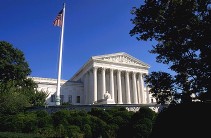The Truth About "Natural" Healing
-- Ten Things You Should Know
5. Is It Legal?
UNDERSTAND FIRST: What you're about to read here is NOT LEGAL ADVICE! You need a LAWYER familiar with YOUR STATE, COUNTRY OR PROVINCE to ADVISE you or APPLY THE LOCAL LAW TO YOUR SPECIFIC CIRCUMSTANCES. This editor cannot be relied upon even for legal INFORMATION. But an effort has been made to find sources for such. Hopefully the brief summary here will give you a start.
Some information may seem vague or ambiguous until you examine it more closely. It appears that in the U.S. for example, the only WRITTEN laws about health care decisions are various state statutes authorizing what have come to be called "living wills" or more correctly "advance medical directives" or "durable power of attorney for health care" forms. (See dpa.htm for more details on this.)
However several IMPLIED laws have been recognized by at least the higher courts in the U.S. Constitution's Fourteenth Amendment, Section 1, second sentence: "No State shall make or enforce any law which shall abridge the privileges or immunities of citizens of the United States; nor shall any State deprive any person of life, liberty, or property, without due process of law; nor deny to any person within its jurisdiction the equal protection of the laws."
About a hundred years ago the New York Court of Appeals applied this "due process clause" to medical treatment in Schloendorff v. Society of New York Hospital, 105 N.E. 92 (N.Y. 1914). Justice Cardozo stated: "Every human being of adult years and sound mind has a right to determine what shall be done with his own body and a surgeon who performs an operation without his patient's consent commits an assault for which he is liable in damages." (Similarly some recent legal commentaries propose that the failure of a medical practitioner to respect a patient's advance directive is medical battery.)
Many years later, this same court in re Storar, 438 NYS 2d 266,
273, 420, NE Zd 64, 71 (NY 1981) declared "the patient's right
to determine the course of his own treatment paramount" and added
that A "DOCTOR CAN NOT BE HELD TO HAVE VIOLATED HIS LEGAL OR
PROFESSIONAL RESPONSIBILITIES WHEN HE HONORS THE RIGHT OF A
COMPETENT ADULT PATIENT TO DECLINE MEDICAL TREATMENT."
[also quoted in "How Can Blood Save Your Life?" WBTS 1990 P.30]
Shortly before this the American Medical Association Office of the
General Counsel on p.24 of it's 1973 edition "Medicolegal Forms
with Legal Anslysis" called the individual patient "the final
arbiter as to whether he will take his CHANCES WITH the treatment
or operation recommended by the doctor or RISK living without it."
And added: "Such is the natural right of the individual, which
the law recognizes." (NOTICE there are MEDICALLY ACKNOWLEDGED
"chances" and "risks" BOTH WAYS --- WITH OR without medical
treatment.)
[also quoted in "How Can Blood Save Your Life?" WBTS 1990 P.31]
More recently in what might be called a "landmark case" for application of the "due process clause", the "common law right to bodily integrity" or self determination, and the "doctrine of informed consent", the United States Supreme Court in Cruzan v. Missouri Department of Health, 497 U.S. 261 (1990) stated: "The principle that a competent person has a constitutionally protected liberty interest in refusing unwanted medical treatment may be inferred from our prior decisions. In Jacobson v. Massachusetts, 197 U.S. 11, 2430 (1905), for instance, the Court balanced an individual's liberty interest in declining an unwanted smallpox vaccine against the State's interest in preventing disease. ... Just this Term, ...we recognized that prisoners possess "a significant liberty interest in avoiding the unwanted administration of antipsychotic drugs under the Due Process Clause of the Fourteenth Amendment." Washington v. Harper, U.S. , (1990) (slip op., at 9); see also id., at (slip op., at 17) ("The forcible injection of medication into a nonconsenting person's body represents a substantial interference with that person's liberty"). Still other cases support the recognition of a general liberty interest in refusing medical treatment. Vitek v. Jones, 445 U.S. 480, 494 (1980); Parham v. J.R., 442 U.S. 584, 600 (1979) ... This notion of bodily integrity has been embodied in the requirement that informed consent is generally required for medical treatment. ... The informed consent doctrine has become firmly entrenched in American tort law. ...The logical corollary of the doctrine of informed consent is that the patient generally possesses the right NOT to consent, that is, to refuse treatment. ...with the advance of medical technology capable of sustaining life well past the point where natural forces would have brought certain death in earlier times, cases involving the right to refuse life-sustaining treatment have burgeoned. See 760 S.W. 2d, at 412, n.4 (collecting 54 reported decisions from 1976-1988)."
So the courts appear to agree with often-quoted British political /
ethical philosopher John Stuart Mill's famous 1859 essay "On
Liberty". He explains why this is "the ugly" part: "The will of the
people...means the will of the most numerous or the most ACTIVE PART
of the people; the majority, OR THOSE WHO SUCCEED IN MAKING
THEMSELVES ACCEPTED AS THE MAJORITY : the people, consequently, MAY
desire to oppress a part of their number; and precautions are as
much needed against this, as against any other abuse of power."
..."Protection, therefore, against the tyranny of the magistrate is
not enough; there needs protection also against the tyranny of the
PREVAILING OPINION AND FEELING;" ... ... "The only purpose for which
power can be rightfully exercised over any member of a civilized
community, against his will, is to prevent harm to others. ...He
cannot righfully be compelled ...because, in the opinions of others,
...it will be better for him, ...make him happier, ...would be wise,
or even right. ...Over himself, over his own body and mind, the
individual is sovereign." ..."Each is the proper guardian of his own
health, whether bodily or mental or spiritual. Mankind are greater
gainers by suffering (archaic for "allowing") each other to live as
seems good to themselves, than by compelling each to live as seems
good to the rest."
[also quoted in "How Can Blood Save Your Life?" WBTS 1990 P.31]
Recent legal commentaries likewise note a widespread recognition of a firmly entrenched right to refuse medical treatment by competent patients and the guardians or surrogates of incompetent or unconscious patients; and add that although it is most often taken to mean the right to refuse a particular medical procedure, it extends to include the right to cease all medical care.
what's the problem?
[ Please Click/Touch Here To Continue ]
E-Book Copyright 2007-2025
Low Tech Concepts
How is it that otherwise rational, caring individuals (who would
adamantly resent being deprived of THEIR choice of what's done to
THEIR body) can view YOUR choice of health care (in U.S. of A.
terminology) as a bill that just passed the House and Senate, and
themselves as the President who has some awesome responsibility to
veto it?
----------------------------------
So---- CAN you LEGALLY refuse Medical treatment?
See (in addition to this page) ---
https://www.psychologytoday.com/us/blog/emotional
-nourishment/202103/refusing-medical-treatment-do
-you-have-the-right-to-say-no
for a few more details.
----------------------------------
"Signing of the [U.S.] Constitution"

Painting by Howard Chandler Christy
----------------------------------
You are reading --- The Truth
About "Natural" Healing --- Ten Things You Should Know
1. What IS It --- REALLY?
--- Scientific "Alternative Medicine"?
OR Psychosomatic Occult Superstition?
2. The Issues ---
Widespread Claims & Misconceptions
3. Is It Safe?
4. Is It Scientific?
5. Is It Legal?
( THE PAGE YOU ARE NOW READING.)
6. What's the REAL Problem?
7. Is It Enough? ---
Growing Up REALLY Drug Free --- A True Story
8. Is It For YOU?
9. How Does It Work? --- Unconventional
Concepts of Illness & Health
10. How You Can Learn More
----------------------------------
U.S. Supreme Court building Washington, DC

USDA photo by Ken Hammond.
<---------------------------------
More from John Stuart Mill?
<---------------------------------
Appendix --- Questions from Readers and
Other Observations
Appendix 2 --- Natural Healing/Prevention of the
Alarming Illnesses Associated with Coronavirus and Other "Microbes"
--- and --- why Medicine is a Blue Poly Tarp
Appendix 3 --- Fake Food --- Real Food
--- The Simple, Uncomplicated Basics of Truly "Eating Healthy"
Living Wills, Advance Medical Directives, and
Serious Considerations
Editorial "Scribble Notes"
---Previous
"Front Page" topics; and other Quasi-relevant
observations that don't directly fit any particular page here
So---- CAN you LEGALLY refuse Medical treatment? See (in addition to this page) --- https://www.psychologytoday.com/us/blog/emotional -nourishment/202103/refusing-medical-treatment-do -you-have-the-right-to-say-no for a few more details.
----------------------------------
"Signing of the [U.S.] Constitution"

Painting by Howard Chandler Christy
----------------------------------
You are reading --- The Truth About "Natural" Healing --- Ten Things You Should Know
1. What IS It --- REALLY? --- Scientific "Alternative Medicine"? OR Psychosomatic Occult Superstition?
2. The Issues --- Widespread Claims & Misconceptions
3. Is It Safe?
4. Is It Scientific?
5. Is It Legal?
( THE PAGE YOU ARE NOW READING.)
6. What's the REAL Problem?
7. Is It Enough? --- Growing Up REALLY Drug Free --- A True Story
8. Is It For YOU?
9. How Does It Work? --- Unconventional Concepts of Illness & Health
10. How You Can Learn More
----------------------------------
U.S. Supreme Court building Washington, DC

USDA photo by Ken Hammond.
<---------------------------------
More from John Stuart Mill?
<---------------------------------
Appendix --- Questions from Readers and Other Observations
Appendix 2 --- Natural Healing/Prevention of the Alarming Illnesses Associated with Coronavirus and Other "Microbes"
--- and --- why Medicine is a Blue Poly Tarp
Appendix 3 --- Fake Food --- Real Food --- The Simple, Uncomplicated Basics of Truly "Eating Healthy"
Living Wills, Advance Medical Directives, and Serious Considerations
Editorial "Scribble Notes" ---Previous "Front Page" topics; and other Quasi-relevant observations that don't directly fit any particular page here
Click (Or Touch) Each Picture For It's OWN copyright, additional credits and available background information --- including notes on its connection to the subject when not obvious.